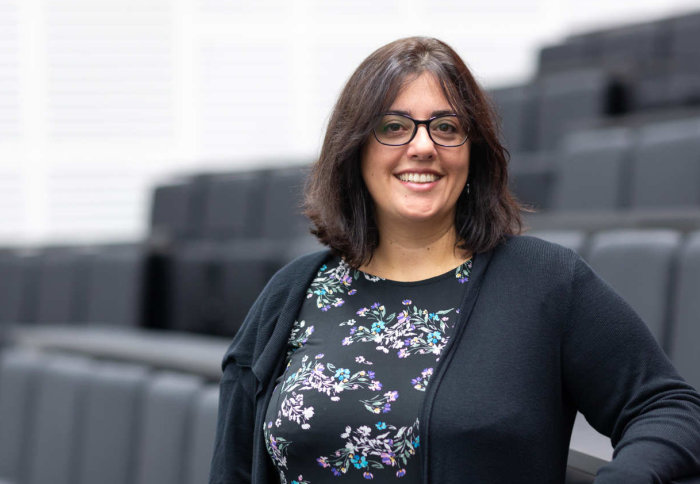Nano-electrochemistry: theory meets experiment

Dr Clotilde Cucinotta, who alongside Dr Stefano Mezzavilla gave the latest IMSE Lunchtime Seminar.
The latest Lunchtime Seminar from the Institute for Molecular Science and Engineering looked at utilising light to analyse and control biology.
Dr Clotilde Cucinotta from the Department of Chemistry and Dr Stefano Mezzavilla from the Department of Materials delivered the latest IMSE Lunchtime Seminar on the topic of nano-electrochemistry.
Dr. Cucinotta’s began the seminar by introducing her research interest in quantum mechanical modelling of materials and electrochemical (EC) processes at the nanoscale.
Her research group currently works to develop a new methodology to simulate EC devices – such as fuel and solar cells, batteries, supercapacitors and sensors, including the effect of applied potential and electric currents. They use this to study problems like EC corrosion, water splitting, redox switching and current induced effects at nanointerfaces.
Using gold to reduce CO2 levels
Electrochemical energy conversion technologies, such as fuel cells and electrolysers, are progressively entering our daily lives and they will undoubtedly play an essential role in the future. They also have the potential to revolutionize the production of commodity chemicals, by
They also have the potential to revolutionize the production of commodity chemicals, by converting CO2 and bio-based compounds (instead of the current petroleum-based feedstock) making direct use of renewable electricity. Dr Stefano Mezzavilla Imperial College Research Fellow
converting CO2 and bio-based compounds (instead of the current petroleum-based feedstock) making direct use of renewable electricity. To enable these technologies, major breakthroughs are necessary to discover active and stable functional electrode materials, i.e., electrocatalysts, capable to accelerate target reactions.
In his presentation Dr Mezzavilla discussed two examples where advanced synthetic and characterization methods led to development of stable electrodes and to new insights in our understanding of electrocatalytic processes.
The first was a class of advanced catalysts for the oxygen reduction reaction in Proton Echange Membrane fuel cells. Thanks to the “pore-confinement effect”, his team of researchers are able to synthesize catalysts with remarkable mass activities coupled with an excellent stability over an extended accelerated degradation protocol.
The second was an investigation into the electrocatalytic conversion of CO2 to CO using gold single crystals. Here, Dr Mezzavilla showed that atomic steps and undercoordinated sites control the activity of gold for the electrocatalytic CO2 reduction.
About IMSE
The Institute for Molecular Science and Engineering (IMSE) is one of Imperial College London's Global Institutes, drawing on the strength of its four faculties to address some of the grand challenges facing the world today. The Institute's activities are focused on tackling problems where molecular innovation plays an important role.
The Highlight Seminar Series brings eminent speakers from across the globe to Imperial to increase awareness of areas where molecular science and engineering can make a valuable contribution and to promote exchanges with academic and industrial centres of excellence.
Article text (excluding photos or graphics) © Imperial College London.
Photos and graphics subject to third party copyright used with permission or © Imperial College London.
Reporter
Dr Kieran Brophy
Faculty of Engineering